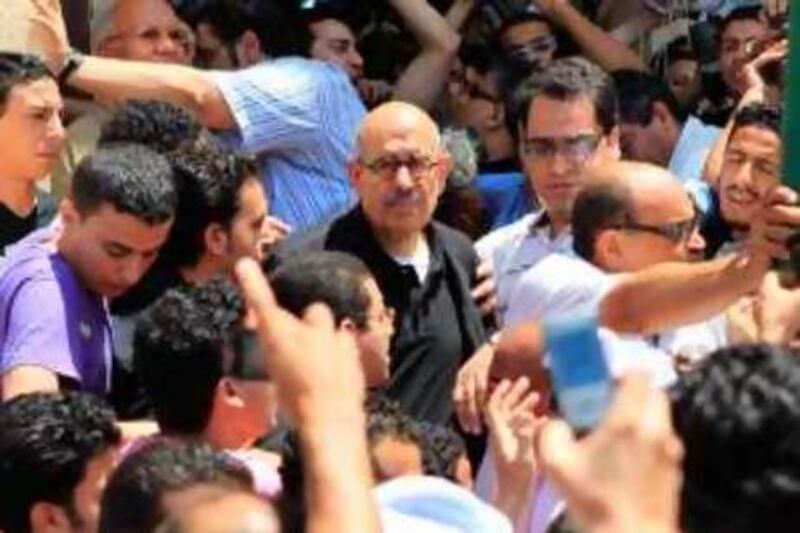ALEXANDRIA // Thousands of protesters, led by the Egyptian opposition leader Mohammed ElBaradei, demanded an end to police brutality in this coastal city yesterday in the largest demonstration yet over the killing of a man who witnesses say was beaten to death by undercover police. Mr ElBaradei, the former chief of the nuclear watchdog IAEA, along with his wife and son travelled from Cairo to attend the protest, which was held after Friday prayers at Sidi Gaber Mosque, not far from the internet cafe where Khaled Said, 28, was allegedly beaten to death on June 6.
"The protests are a message from the Egyptian people that they don't accept torture," he told reporters. "I hope the regime gets the message. If they don't there will be a real problem. The writing is on the wall." Mr ElBaradei, who had earlier met Said's family to offer condolences, was mobbed by the 4,000-strong group of protesters who chanted, "Oh, Dr Baradei, we will not leave you, don't leave us or Egypt, Oh, doctor."
This is Mr ElBaradei's first appearance at a street protest since he returned to Egypt in February to become the country's most high-profile reform champion. Mr ElBaradei has toured the country since his return and has been vocal in criticising the policies and practices of the Egyptian government, calling for political and economic reform. The protesters demanded the ouster of Habib el-Adly, the interior minister, who they say has failed to bring to justice those accused of torture.
According to witnesses, Said was killed when plainclothes policemen dragged him out of an internet cafe and beat him to death on a busy Alexandria street. Egypt's interior ministry said he had died from asphyxiation after swallowing a bag of narcotics when approached by officers. But a picture of Said's battered face taken by his elder brother Ahmed has circulated on the internet, sparking an outcry from international rights groups. Said has become a symbol for rights activists against police brutality.
Tens of thousands have joined a group named after Said on Facebook, and thousands have been protesting on an almost daily basis in Alexandria. A second autopsy on Said's body, the results of which were released on Wednesday, confirmed the initial forensic report that he died from swallowing a bag of cannabis. Hassan Mesbah, the owner of the internet cafe where Said was killed, said that "in less than a minute after Khaled entered the cafe, two men attacked him from behind, started banging his head against a marble counter, then took him to the next building and continued to bang his head against the metal gate.
"He was screaming and telling the two men he was dying, but they kept hitting him until he died. The whole thing lasted for 10 to 15 minutes. "Less than 10 minutes later, a police van came and dumped him in the street as if he was a garbage bag, and left," he added. Yesterday's protesters, who were mostly dressed in black, were outnumbered by thousands of anti-riot police. They chanted "long live Egypt" and "God is great" but eventually started chanting against Hosni Mubarak, the president, and Mr el-Adly, demanding the punishment of the perpetrators, and vowed revenge for "Khaled, the martyr of the emergency laws".
Some women were sobbing at the protest, while others held red flowers. Sanaa Wagih, 50, a housewife, said: "I came to this protest because Khaled could have been my brother or my son. Khaled is not an activist, so this could happen to anyone, which was a wake-up call for all of us. If we don't stand up now, they will crush us even more." An anti-riot officer said: "We don't like being here, and surrounding protesters like this, but it's police orders. But I won't beat the protesters. God is above all."
Other prominent leaders of opposition parties and groups attended the protest, including the former presidential candidate Ayman Nour of El-Ghad party and Osama el-Ghazali Harb of the Democratic Front party. Members of the officially banned Muslim Brotherhood also attended. Said died across from the building where he was living with his mother, Laila Marzouq, who said as she sat, dressed in black, in their apartment surrounded by Said's older brother Ahmed, 40, and his sister Zahraa, 30, and other mourners: "I can't explain how I feel.
"But I'm so happy that all these people are standing by my side, as if God sent them to me to tell me that each one of them is my son Khaled, which shows that God is on our side and against the oppressors." @Email:nmagd@thenational.ae * With additional reporting by Agence France-Presse





